Denemek ALTIN - Özgür
Flying Precision Rolls
Model Airplane News
|March 2020
The secrets to smooth, well-positioned maneuvers

Together with loops, rolls are the bedrock upon which aerobatic flying is built. Learning to perform them correctly and efficiently is integral to opening the door to thousands of different maneuvers. There are varying opinions regarding the best approach to teach rolls, and certain methods can promote faster rates of learning and more successful results. This article features the timeless crawl-walk-run method which, during 1st U.S. RC Flight School’s aerobatic courses, proved to be one of the most time-effective approaches for developing roll proficiency.
BASIC ROLLS
The basic aileron roll starts by pulling the airplane up into a 10- to 20-degree climb. This way, the pilot doesn’t have to worry about altitude or the ground and can then apply full left- or right-aileron and roll all the way around (Figure 1). The most important step in this sequence is making sure that you’ve neutralized the elevator used to set the climb before you apply aileron. This precaution ensures that the roll remains axial and on the same heading. Novice pilots must be especially careful not to get ahead of themselves by directly applying aileron while holding in the elevator. This can result in a clumsy barrel roll and loss of heading (Figure 2). Once you have initiated the roll, you need to focus all of your attention on preparing to quickly neutralize the aileron the instant the wings approach level.
Bu hikaye Model Airplane News dergisinin March 2020 baskısından alınmıştır.
Binlerce özenle seçilmiş premium hikayeye ve 9.000'den fazla dergi ve gazeteye erişmek için Magzter GOLD'a abone olun.
Zaten abone misiniz? Oturum aç
Model Airplane News'den DAHA FAZLA HİKAYE
Model Airplane News
Legend Hobby / Seagull Models - Cessna Grand Caravan 208
The Cessna Grand Caravan 208 is a legend in aviation circles. A single engine utility aircraft that punches up with capabilities that rival many twin engine aircraft in its class. Its seemingly simple configuration belies its near extreme utility.
8 mins
January 2022
Model Airplane News
PROPER CG LOCATION FOR AEROBATICS
If you are getting into aerobatics and are starting to perform more advanced maneuvers, it is time to discuss ways you can not only become a better pilot, but how you can also improve the flight characteristics of your airplanes.
5 mins
January 2022
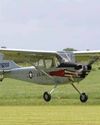
Model Airplane News
Legend Hobby 13-Foot L-19 Bird Dog/ Cessna O-1
This famous multi-mission single engine observation aircraft served from 1950-1974. From calling out target locations to providing intel/recon information, the Bird Dog was a valued asset in both the Korean War and Vietnam.
1 min
January 2022
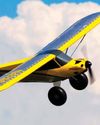
Model Airplane News
EARN YOUR WINGS
10 Tips for First-Flight Success
6 mins
January 2022
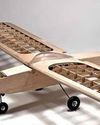
Model Airplane News
Old School Model Works Fifty Six
The Fifty Six takes its design cues from the original .09- to .15-size Carl Goldberg Falcon 56 of the 1960s. Reworked to incorporate modern, lasercut techniques to make kit building better than ever.
1 mins
January 2022
Model Airplane News
FLYING TWINS Multi-engine warbirds made easy
Let’s face it, there’s just something extra special about twin-engine RC aircraft. Most modelers stop what they’re doing when a twin fires up on the flightline.
6 mins
January 2022
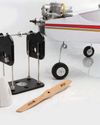
Model Airplane News
HOW TO BALANCE PROPELLERS
Four easy steps to increase performance and reduce vibration
5 mins
January 2022
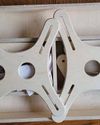
Model Airplane News
PRODUCT REVIEW: RC PLANE STANDS BENCHTOP MODEL
I’m a sucker for shop stuff. I buy tools I will probably never use just because they are cool, or I might need to use them someday. When Glen from RC Plane Stands reached out about a review, however, I knew as soon as I browsed their website that I would be receiving something I would use a lot, maybe even daily.
2 mins
January 2022
Model Airplane News
SPIRIT OF RHINEBECK AWARD WINNER
A close up of Norman Malinowski’s 1/3-scale Albatros
3 mins
January 2022
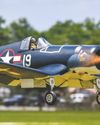
Model Airplane News
CENTER OF GRAVITY BASICS
The secret to a plane that flies well
6 mins
July 2021
Translate
Change font size
